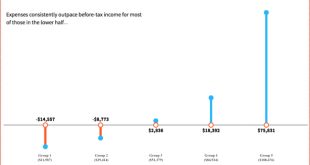from David Ruccio Most Americans are not loading sixteens tons of coal. But they are, even in the midst of the recovery from the Second Great Depression, sinking deeper and deeper into debt. According to a recent analysis by Reuters [ht: ja], the bottom 60 percent of income-earners have accounted for most of the rise in consumption spending over the past two years even as their finances have worsened.* The data show the rise in expenditures has outpaced before-tax income for the lower 40...
Read More »Lessons from Polanyi
from Jorge Buzaglo “Under the gold standard the leaders of the financial market are entrusted, in the nature of things, with the safeguarding of stable exchanges and sound internal credit on which government finance largely depends. The banking organization is thus in the position to obstruct any domestic move in the economic sphere which it happens to dislike, whether its reasons are good or bad. In terms of politics, on currency and credit, governments must take the advice of the...
Read More »Let’s Make a Deal
This may be what Mueller is saying to Manafort, but I include those names just to try to trick google and get clicks. I want to write about the very well known Monte Hall paradox. For the kids, there was this show “Let’s Make a Deal” featuring contestants and host Monte Hall who acted like a sleazy salesman trying to trick them. One constestant was the winner who got the final prize. They chose one of three doors. There as a big prize behind one of the...
Read More »Self Plagiarism Dissertation on Essay Writing Service
A website to own argumentative essays Us scientific studies dissertation guidelines give to own groundwork accomplished get better at thesis what exactly is it a website to choose argumentative essays. A Website To Acquire Argumentative Essays A web site to choose argumentative essays. To see you the fact. Custom-made making essays; Acquire school essays onlin; [...]
Read More »Open thread July 31, 2018
NEGative on NEG
I’ve just joined 22 other Australian energy researchers in calling for the release of the modelling used to justify the Abbott-Turnbull government’s National Energy Guarantee. Until this is out in the open, state and federal Labor should have nothing to do with the NEG. I am confident that, once the modelling is released, it will quickly be shown to be so weak as to provide no support for this camel of a policy, designed to placate both the Abbott denialists and the business lobby who...
Read More »The state of ‘New Keynesian’ economics
from Lars Syll The standard NK [New Keynesian] model, like most of its predecessors in the RBC literature, represents an economy inhabited by an infinitely-lived representative household. That assumption, while obviously unrealistic, may be justified by the belief that, like so many other aspects of reality, the finiteness of life and the observed heterogeneity of individuals along many dimensions … can be safely ignored for the purposes of explaining aggregate fluctuations and their...
Read More »Scholarship Essay Contests 2011 For College Students
Regretably, no such hold exist. Lucky suitable for you, then again, one can find specialized writing companies that have got for an similar chore - and EssayMap.org is the most suitable! We may not have a shop, but there exists a 24/7 support service hub, willing authors and ideal providers geared to both of those [...]
Read More »A bit more of the iceberg
Just a day after this post on wrongdoing in the pursuit of the government’s anti-union agenda comes the news that the AFP is liaising with the Commonwealth Director of Public Prosecutions about whether charges should be laid over leaks from Federal Jobs Minister Michaelia Cash’s office about raids on the Australian Workers Union. It remains to be seen whether charges will be laid – if so, it will be a breach of the normal protocol under which unionists are charged in the most trivial...
Read More »Sandpit
A new sandpit for long side discussions, conspiracy theories, idees fixes and so on. Like this:Like Loading...
Read More » Heterodox
Heterodox


